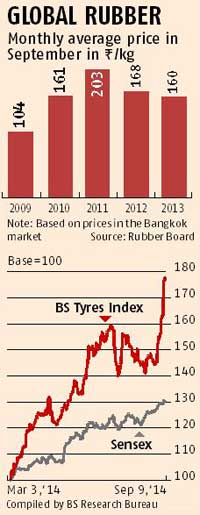Rubber planters see a crisis-like situation looming, with international rubber prices falling in the Bangkok market to a seven-year low of Rs 100 a kg. This has resulted in a sharp rise in imports by Indian rubber consuming industries such as the tyre industry. In the face of a heavy inflow of imported rubber, domestic prices, too, fell to a five-year low of Rs 124 a kg for the benchmark variety, RSS-4, on Wednesday.
While tyre companies smile at the price drop, planters have written to theRubber Board and the commerce ministry for a ‘safeguard duty’ on imports. At present, the import tax is 20 per cent.
This is for the first time since 2007 that the international market drops to Rs 100 levels. In September last year, the average price in Bangkok was Rs 160 a kg.
On Wednesday, the Standard Malaysian Rubber quoted at only Rs 92. The Malaysian rubber market extended its losses, tracking the weak performance on the Tokyo Commodity Exchange (TOCOM) and Shanghai Futures Exchange, amid further decline in crude oil prices. All the contracts at TOCOM on Wednesday moved lower in a range of 0.6-1.5 per cent. The market has been persistently lower for the past couple of weeks.
Shares of tyre companies Ceat, Apollo Tyres, JK Tyres and MRF Tyres here surged significantly in the past six moths. The tyre index, compiled by BS Research, comprising the share price of tyre companies, has seen a surge of 77.5 per cent from March following the steep fall in natural rubber prices, which will have a positive impact on the companies’ profitability.

Experts say the price advantage will erode the impact due to cost escalation in the past and will help bring more investment into the sector.
According to the Rubber Board, local prices have seen the sharpest fall in five years, hitting Rs 124 a kg. Rubber prices are down 25 per cent from the average of Rs 169 a kg in January. A slowdown in demand from China, the world’s biggest consumer of rubber, along with over supply in markets such as Thailand, has sent international rubber prices spiralling down in the past year.
Another reason is that demand has not matched the surge in supply over the past three years. This has pushed down rubber prices, with rubber futures plunging 28 per cent this year to the lowest level in five years. Also, the fall in crude oil prices to below $100 a barrel is a big positive for tyre makers, as 30 per cent of the raw material cost comes from crude derivatives, while 50 per cent comes from natural rubber.
<B>‘Impose safeguard duty’</B>
The United Planters’ Association of Southern India has demanded that a safeguard duty on natural rubber be imposed to protect the domestic plantations from the vagaries of prices.
The Association’s appeal follows the steep decline in average monthly prices from Rs 245 a kg in April 2011 to Rs 143 in May 2014, and further down to Rs 130 in August.
According to the planters’ body, the main reason for the decline in domestic prices is rising imports.
Destination-wise imports indicate the shipments from Indonesia and Vietnam increased 37 per cent to 360,000 tonnes in 2013-14 from 263,000 tonnes in 2012-13.
Early import trends during the current financial year further confirm it is continuing at a much faster pace, suggesting the possibility of another record rubber imports. According to Rubber Board’s data, during the April-July 2014 period, 133,789 tonnes of natural rubber were brought into the country. Experts feel the total import would cross 400,000 tonnes this financial year. During 2013-14, India had imported 325,190 tonnes compared with 217,364 tonnes in 2012-13.
The Association has also sought a detailed scrutiny on the norms followed in fixing the import quantum under the advance licensing scheme or the Duty Exemption Entitlement Certificate scheme.
Source: Business Standard


























